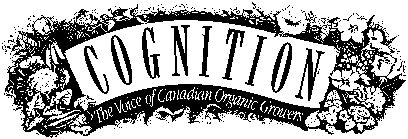

Cognition Index | Virtual Library
| Magazine Rack
Search
| Join the Ecological Solutions Roundtable
by Jenafer Brammer
Now, more than ever in agriculture, the relationship between the grower and the consumer is challenged to become refocused. As consumers, the powerhouse of multinational corporations leaves us stranded in a coupon-clipping, grocery-store culture. In our alienation from farmers and rural ways of life, we are losing our choices for wholesome, sustainably grown food; culturally and socially, we are being cheated out of the connections that bring us together in community on the land.;
Youth are especially targeted by fast-food-style marketing and we are increasingly growing up in urban areas. These factors certainly determine the food choices we will make as consumers throughout our lives and affect whether we will live more sustainably as the future leaders in our communities. Just as organic agriculture is crucial in working towards environmental sustainability, so is the necessity of empowering young people to be more aware, responsible consumers (conservers!) teaching them the value of organic food.
Many young people don’t realize that our food is often sprayed with pesticides, or dipped in chlorine, or polished with wax, or all of the above! We aren’t rallying to support organic agriculture as we might with a hotter topic like recycling. Many of us have never even seen a farm, let alone come to any kind of understanding of the enormous work that goes into the planting, growing, harvesting and marketing of our food from small-scale farms. We relate more to urban toys and games than we do to the cycle of the seasons or the interconnected system of plant, insect and soil life in a garden.
This past summer, thanks to a grant from the Environmental Youth Corps, I was one of five young people hired by the Ottawa Youth Bioregional Initiative to come up with effective and fun ways of exploring these and other environmental issues with about 40 local youth volunteers. Many of our activities centered around organic agriculture as bioregionalism encouraged us to eat organically from local farmers. For example, we organized a chalk mural promoting local organic food in the downtown market. We made masks to act out different food and farmer characters in a guerilla street theater skit about pesticides and multinationals. A group of young people paid a weekend working-visit to a local organic farm, Go Greens, where we learned about composting, harvested garlic and discussed our ideas and feelings about food and community. We went together on a supermarket tour, doing a scavenger hunt of the different produce there, determining whether it was organic and where it came from. We went to the Ottawa Organic Farmers’ Market and looked at the variety of produce there in comparison, and with many donations of food from the farmers, we cooked a wonderful organic feast that we ate together with many of the farmers and other customers at the market!
Bringing ‘bioregionalism’, ‘environmental sustainability’ and ‘organic agriculture’ down the garden path in an exciting, creative, hands-on way impressed their value upon these young people who, for the most part, had little previous understanding of or interest in them. Many of the volunteers involved in the project left determined to make changes in their lifestyles. Some arranged orders from the farmers; others brought their parents to the organic market; still others planned workshops at their high schools and events out at the farm!
Jenafer Brammer is a community outreach coordinator with the Ottawa Youth Bioregional Initiative and a student in Arabic Studies at the University of Ottawa. After completing a degree in international development, she will specialize in agricultural issues
Copyright © 1996.
Jenafer Brammer.Reprinted with permission. All rights reserved.
Info Request | Services | Become EAP Member | Site Map
Give us your comments about the EAP site
Ecological Agriculture Projects, McGill University (Macdonald
Campus)
Ste-Anne-de-Bellevue, QC, H9X 3V9 Canada
Telephone:
(514)-398-7771
Fax:
(514)-398-7621
Email: info@eap.mcgill.ca
To report problems or otherwise comment on the structure of this site, send mail to the Webmaster